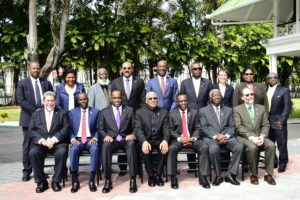
The Caribbean Community’s (CARICOM’s) continued inability to expedite meaningful integration, and effectively implement the Caribbean Single Market Economy (CSME) is putting the future of the Caribbean economies in jeopardy, according to President David Granger.
The Head of State was at the time addressing the opening of the Twenty-Eighth Inter-Sessional Meeting of the Conference of Heads of Government of CARICOM, at the Marriott Hotel on Thursday morning. morning.
According to GINA, President Granger, the current chairman of CARICOM, said that if the Caribbean is to escape the hazard of economic emasculation in today’s global environment, then it must expedite the full implementation of the CSME.
“We face threats that include dampened demand for our goods and services, and distortions in our financial sectors caused by de-risking by international banks.The CSME has the potential to enhance private sector growth and competitiveness by providing access to a larger pool of resources, facilitating the movement of human capital, catalysing the establishment of regional businesses and encouraging the free movement of goods. The CSME must not be allowed to become a victim of equivocation and procrastination,” the President said.
Also addressing the opening of the conference, CARICOM Secretary-General Ambassador Irwin La Rocque said that the CSME was the best vehicle to promote the region’s overall economic growth and development.
La Rocque noted that the majority of the regional member states have been grappling with low growth and as a consequence, pressure ontheir fiscal position. Further, the efforts to combat these challenges have been hampered by the foreign banks de-risking, and the continuing damaging effects of climatic events, La Rocque observed. He said that pursuing the course of action to emerge from that position is therefore of paramount importance. “I contend that dealing with those and other challenges demand that we work more than ever collectively and that we pool our resources,” he said, reiterating the call for the full implementation of the CSME.
In the past few years, the region has faced a mixed economic outlook. The vulnerability of the economies was exposed in 2016, as a new mosquito-borne virus, Zika, threatened tourism goals, and falling commodity prices impacted on the fortunes of exporters of Guyana, Trinidad and Tobago and Suriname.
Regional integration has long been seen as a response to protect the economies of the Caribbean from the effects and challenges from globalization, and the emergence of trade blocs. Little progress however, has been achieved under the CSME which was established since 2006 to achieve this objective. The CSME was expected to support the free movement of goods, services, skills and cross border establishment of businesses.
The CSME, crime and security and correspondent banking are among the issues that will be discussed during the two-day CARICOM Inter-Sessional Heads of Government meeting.
The Heads of Government present at the meeting will be considering a comprehensive review of the CSME, particularly how the initiative has measured to intent and expectations, and how the shortcomings might be addressed.



